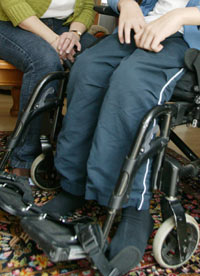Carers of children with disabilities need respite
Carers of children with disabilities need respite
Closing short breaks units will pile even more pressure on the already stressed parents of disabled children
- Kate Belgrave
- guardian.co.uk,
- Monday 6 June 2011 15.34 BST

This month, Lancashire county council will start to consult parents of children with disabilities about plans to close some of the county’s short breaks units (once called respite). The units give parents much-needed breaks from caring, and children a chance to socialise.
The plans to close units could impact on families such as Colin and Jennifer Dalley’s. They have three daughters with learning disabilities and behavioural problems, all needing supervision and support. The youngest, Kirsty, 11, needs constant care and monitoring, because she has severe epilepsy. She has an adapted bed and bathroom.
The Dalleys are full-time carers, and they struggle with isolation and exhaustion. Both have been treated for depression over the years. They manage the children, the behavioural problems (their eldest is prone to aggressive outbursts), transport, equipment, relationships with social workers, endless correspondence with the council, journeys to and from school, doctors and so on. They’re also employers – they use direct payments to manage two carers who help the family before and after school, and take Kirsty out on weekends.
They get a break when Kirsty goes to a short break unit for overnight stays. Kirsty spends several nights a month at Maplewood House – a residential unit with adapted beds, bathrooms, a playroom, a sensory room and professional staff. With Kirsty at Maplewood, “you get to sleep”, says Colin. “You have a night when you’re not worried … because obviously, with her epilepsy, when she’s here, you’re always worried.” He says he accepts “some cuts have to happen”, but that he didn’t expect short breaks units to be targeted. He and Jen say they’re grateful for the support they get, but even with that support they struggle. The last thing the family needed was a fight to keep units open. Parents like the Dalleys are on edge.
Uncertainty is part of the problem. Confidence in good care provision is hardly running high. Lancashire agreed cuts of about £179m earlier this year (while sitting on considerable reserves) – a monumental whack that hasn’t exactly put service users at ease as they look for guarantees that the council will do the right, rather than cheap, thing when it comes to care.
Parents say they’ve been told two short breaks units will close in the next year, but not which ones, or when. I struggled to winkle specifics out of council leader Geoff Driver myself – he told me “one of the likely consequences” of budget assessment would be that one or two units would close (the council says they are not fit for purpose, while parents say they should be made fit) but that the council was “not reducing respite care”, and was “reshaping and modernising our whole service for children with disabilities”. The closure exercise will be proceeded by consultation over the summer, in which parents would be involved.
Some parents interpret this as an arse-about order of business – a decision to close followed by a consultation about closure. The proposal in the council’s cuts budget (passed at a splenetic public meeting in February, during which police ejected parents for yelling at councillors) was to cut the number of short breaks units – or, as council-speak had it, to “reconfigure and reduce the number of places maintained by the county council for respite provision for children with disabilities, to reflect falling demand”.
Parents take issue with the “falling demand” claim. They say that if the number of people using short break units is falling, it is only because the council promotes other options (like encouraging parents to organise carers for short breaks themselves using the cheaper direct payments option) and doesn’t tell new parents that units like Maplewood exist (a council leaflet on short breaks doesn’t mention such units).
Local papers have reported that parents who are desperate for short breaks from caring have struggled to get their children into units. Driver becomes a bit unstuck when I touch on this. He says local reporters are “shamelessly and deliberately” stirring up fears, and that Labour party members are also in the mix, pushing buttons for political advantage. Parents I speak to sigh at this – not least because in the past, Labour’s had a go at short breaks units as well. “We don’t play politics with our children,” one mother tells me firmly.
Meanwhile, parents wait – some of them very nervously. Lesley Crawshaw, whose severely disabled 16-year-old daughter Stephanie has been going to Maplewood for short breaks since she was eight, says that council-run service has been her lifeline. “Direct payments wasn’t suitable for me … you’re given a budget to work within just like any corporation or business, but we’re not business managers … I don’t want to have to think about how I’m going to pay for something. I’ve got enough stress as it is.”
Stephanie, who is confined to a wheelchair, needs two carers now that she is grown. Trying to recruit carers who can manage her complex needs can be extremely difficult. Short breaks units can be relied on to deliver that care.
Crawshaw is terrified that Stephanie’s options will shrink or worsen. That’s “care” at the moment – a climate of fear.
http://www.guardian.co.uk/commentisfree/2011/jun/06/short-breaks-units-disabled-children






